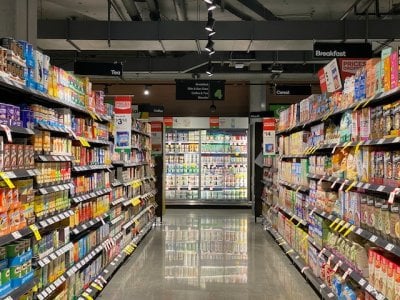Is the 'broken' Australian grocery system costing you money?
By
Seia Ibanez
- Replies 32
The Australian grocery market has been a battlefield for supermarket duopoly Coles and Woolworths, with both companies constantly trying to undercut each other's prices.
While this may seem like a win for consumers, it has exposed a significant issue that is impacting the budget of every Australian shopper.
In the past week, Coles and Woolworths have temporarily dropped the prices of hundreds of items, a move welcomed by Australians grappling with the rising cost of living.
An examination of two grocery baskets containing items for lunch, dinner, and other household items revealed that the disparity in cost between the two was minimal, amounting to just two cents.
According to Matt Grundoff, a Senior Economist from the Australia Institute, ‘We've got a broken grocery market at the moment…certainly an uncompetitive one.’
He suggested that if there were six or seven major supermarkets in Australia, there would be more pressure on them to attract shoppers, leading to more significant price cuts.
The nostalgia of supermarket ads from the past, with jingles like 'Put more in your trolley for less' or 'Why pay more?' brings back memories of when there was more competition in the market.
Supermarkets like Bi-Lo, Franklins, and Safeway have long disappeared, swallowed up by the massive business machines that Coles and Woolworths have become.
German supermarket ALDI has proven that competition works. Since it arrived in Australia in 2000, ALDI has saved Australians over $675 million—which ballooned to $7.8 billion—by pricing some items so low that the major supermarkets had no choice but to lower their own prices.
ALDI has made its reputation as the store that provides the cheapest option over the past 20 years. While it installed self-serve checkouts to help with process improvements, its leaders considered introducing other trends, such as online shopping, to ensure prices remain low.
Despite being Australia’s favourite supermarket 11 times in total, and for the sixth time running, according to Canstar’s Supermarket Satisfaction Ratings, ALDI has only managed to capture 10 per cent of Australian shoppers, according to Finder’s Consumer Sentiment tracker.
Coles and Woolworths, which command 39 per cent and 49 per cent of the market, respectively, made huge profits. They have also been accused of passing on inflationary pressures to Australians.
Two in five Australians have admitted that their grocery bill is one of their most significant stressors.
The Reserve Bank also raised concerns about inflationary pressures passed on to consumers.
But despite inflation, the first quarter results revealed that these two supermarket giants claimed that the fresh produce prices in the first quarter of 2023 were lowered compared to the same period last year—particularly their meat, vegetable, fruit, and deli prices. Read more about the story here.
However, shoppers noticed decreased portions of grocery items, but prices remained the same, such as a bottle of Rose’s English Breakfast Marmalade, which downsized from 500 grams to 375 grams without any price reduction.
Other victims of ‘shrinkflation’ are Nescafé, Coke, Glad Wrap and Smiths chips.
Grundoff claimed that the supermarkets' profits in food sales and grocery divisions showed that they pushed prices higher than cost pressures in the economy.
‘Inflation is higher because Coles and Woolies are increasing their prices more than they otherwise would be if they were just recouping their costs,’ he said.
‘They are part of what economists call an oligopoly. And, essentially, that's why they're able to earn these bigger profits.’
Both supermarkets have stated that deflation in the fresh food sector has led to price drops of up to 40 per cent on some vegetables. However, Grundoff warned that prices should continue to trend downward for Australian shoppers as 'cost shocks work their way through the system', but this will depend on 'how big businesses react'.
‘If they continue to profit take, then it's going to take longer for the inflation to wash through than if they were reacting in a competitive market, he noted.
‘When the spotlight is on them on this issue, they're prepared to do something. But let's be clear, a sale is a temporary thing. And the moment the spotlight is away, they're going to happily let prices revert to going back up again.’
So, what will it take to bring prices down?
The answer is simple: competition.
It is understood that Coles and Woolworths have their own interests to protect, especially since they provide several jobs in Australia. However, neither is forced to take significant risks to cut into the other’s customer base.
Grundoff argued that it is the government's responsibility to step in and regulate to introduce more competition into the grocery market.
‘Morally speaking, Woolworths and Coles shouldn't be profiteering at the moment. But, in this kind of market economy of ours, of course, they are going to maximise profits for their shareholders,’ Grundoff said.
‘It’s the government's responsibility to step in and regulate, do all those things that Coles and Woolworths will scream and shout and say we shouldn't do in order to try and break up or introduce more competition into the grocery market because, ultimately, Coles and Woolworths couldn't do this if there was more competition.’
He suggested that Australia needed laws that would strengthen our policy, pointing to the US as an example, where they have broken up a major oil company into 43 companies.
‘Even the US, the land of the free against government interference, they're actually able to step in if competition is a huge problem and break firms up,’ he said.
‘Imagine if the government stepped in and said, “Coles and Woolworths are too large, so we’re going to break them into four, or six, that are all competing against each other.”’
‘That's the kind of thing that we could do in this country, and this episode of inflation and profit gouging has shown that competition is a problem in Australia, and it needs a large response.’
Meanwhile, in the United Kingdom, shoppers have the option to track down better deals in Sainsbury's, Tesco, ALDI, Morrisons, Lidl, Waitrose and Co-op.
While pushing the government to introduce these laws may not help with the current price blow-out, it could protect Aussies down the road as they are running out of money as other costs mount.
Grundoff warned, 'There will be another inflation spike that will come along in the future. And, to be clear, big businesses will resist this hugely because, at the moment, they can have very large profits doing very little.'

What are your thoughts on the current state of the Australian grocery market? Have you been affected by the recent price war between Coles and Woolworths? Let us know in the comments below.
While this may seem like a win for consumers, it has exposed a significant issue that is impacting the budget of every Australian shopper.
In the past week, Coles and Woolworths have temporarily dropped the prices of hundreds of items, a move welcomed by Australians grappling with the rising cost of living.
An examination of two grocery baskets containing items for lunch, dinner, and other household items revealed that the disparity in cost between the two was minimal, amounting to just two cents.
According to Matt Grundoff, a Senior Economist from the Australia Institute, ‘We've got a broken grocery market at the moment…certainly an uncompetitive one.’
He suggested that if there were six or seven major supermarkets in Australia, there would be more pressure on them to attract shoppers, leading to more significant price cuts.
The nostalgia of supermarket ads from the past, with jingles like 'Put more in your trolley for less' or 'Why pay more?' brings back memories of when there was more competition in the market.
Supermarkets like Bi-Lo, Franklins, and Safeway have long disappeared, swallowed up by the massive business machines that Coles and Woolworths have become.
German supermarket ALDI has proven that competition works. Since it arrived in Australia in 2000, ALDI has saved Australians over $675 million—which ballooned to $7.8 billion—by pricing some items so low that the major supermarkets had no choice but to lower their own prices.
ALDI has made its reputation as the store that provides the cheapest option over the past 20 years. While it installed self-serve checkouts to help with process improvements, its leaders considered introducing other trends, such as online shopping, to ensure prices remain low.
Despite being Australia’s favourite supermarket 11 times in total, and for the sixth time running, according to Canstar’s Supermarket Satisfaction Ratings, ALDI has only managed to capture 10 per cent of Australian shoppers, according to Finder’s Consumer Sentiment tracker.
Coles and Woolworths, which command 39 per cent and 49 per cent of the market, respectively, made huge profits. They have also been accused of passing on inflationary pressures to Australians.
Two in five Australians have admitted that their grocery bill is one of their most significant stressors.
The Reserve Bank also raised concerns about inflationary pressures passed on to consumers.
But despite inflation, the first quarter results revealed that these two supermarket giants claimed that the fresh produce prices in the first quarter of 2023 were lowered compared to the same period last year—particularly their meat, vegetable, fruit, and deli prices. Read more about the story here.
However, shoppers noticed decreased portions of grocery items, but prices remained the same, such as a bottle of Rose’s English Breakfast Marmalade, which downsized from 500 grams to 375 grams without any price reduction.
Other victims of ‘shrinkflation’ are Nescafé, Coke, Glad Wrap and Smiths chips.
Grundoff claimed that the supermarkets' profits in food sales and grocery divisions showed that they pushed prices higher than cost pressures in the economy.
‘Inflation is higher because Coles and Woolies are increasing their prices more than they otherwise would be if they were just recouping their costs,’ he said.
‘They are part of what economists call an oligopoly. And, essentially, that's why they're able to earn these bigger profits.’
Both supermarkets have stated that deflation in the fresh food sector has led to price drops of up to 40 per cent on some vegetables. However, Grundoff warned that prices should continue to trend downward for Australian shoppers as 'cost shocks work their way through the system', but this will depend on 'how big businesses react'.
‘If they continue to profit take, then it's going to take longer for the inflation to wash through than if they were reacting in a competitive market, he noted.
‘When the spotlight is on them on this issue, they're prepared to do something. But let's be clear, a sale is a temporary thing. And the moment the spotlight is away, they're going to happily let prices revert to going back up again.’
So, what will it take to bring prices down?
The answer is simple: competition.
It is understood that Coles and Woolworths have their own interests to protect, especially since they provide several jobs in Australia. However, neither is forced to take significant risks to cut into the other’s customer base.
Grundoff argued that it is the government's responsibility to step in and regulate to introduce more competition into the grocery market.
‘Morally speaking, Woolworths and Coles shouldn't be profiteering at the moment. But, in this kind of market economy of ours, of course, they are going to maximise profits for their shareholders,’ Grundoff said.
‘It’s the government's responsibility to step in and regulate, do all those things that Coles and Woolworths will scream and shout and say we shouldn't do in order to try and break up or introduce more competition into the grocery market because, ultimately, Coles and Woolworths couldn't do this if there was more competition.’
He suggested that Australia needed laws that would strengthen our policy, pointing to the US as an example, where they have broken up a major oil company into 43 companies.
‘Even the US, the land of the free against government interference, they're actually able to step in if competition is a huge problem and break firms up,’ he said.
‘Imagine if the government stepped in and said, “Coles and Woolworths are too large, so we’re going to break them into four, or six, that are all competing against each other.”’
‘That's the kind of thing that we could do in this country, and this episode of inflation and profit gouging has shown that competition is a problem in Australia, and it needs a large response.’
Meanwhile, in the United Kingdom, shoppers have the option to track down better deals in Sainsbury's, Tesco, ALDI, Morrisons, Lidl, Waitrose and Co-op.
While pushing the government to introduce these laws may not help with the current price blow-out, it could protect Aussies down the road as they are running out of money as other costs mount.
Grundoff warned, 'There will be another inflation spike that will come along in the future. And, to be clear, big businesses will resist this hugely because, at the moment, they can have very large profits doing very little.'
Key Takeaways
- Supermarkets Coles and Woolworths are in a price battle, temporarily dropping the price of hundreds of items, but it has exposed a problem in Australia's grocery market.
- ALDI's low pricing strategy has forced major supermarkets to reduce their own prices, saving Australian shoppers significant amounts of money.
- Despite ALDI's success, Coles and Woolworths still corner the majority of the market, controlling 39 per cent and 49 per cent, respectively.
- According to economist Matt Grundoff, Australia's grocery market is 'broken' and 'uncompetitive', and he suggests further competition regulation is needed to address this issue.
Last edited:









